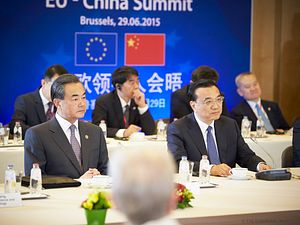Chinese investments in the European Union have been facing impediments, with European governments subjecting China’s merger and acquisition (M&A) targets to extra scrutiny. The number of accomplished Μ&Αs in EU have decreased and approximately $40 billion in deals have been lost due to the change of Europe’s approach, as EU member states appear reluctant to greenlight Chinese investment in the name of economic and national security interests.
While there have not been any official statements so far, China has responded indirectly by canceling the meetings of Chinese government representatives with Sigmar Gabriel, Germany’s deputy chancellor and economics minister, who has expressed his opposition to the unlimited Chinese “intrusion.” However, the current turmoil may provide both sides with a valuable chance to redefine the framework of their investment relations, seeking mutual compromises which will be in investors’ interest.
Starting from 2005, Chinese investors have been expanding their activities in EU. Last year the total amount of Chinese investments in the region mounted to €20 billion ($22 billion), according to official data from Rhodium Group. Chinese enterprises have a preference for acquiring companies with a strong brand name and a solid clientele in order to consolidate their presence in European markets. Based on this strategy, Chinese firms have targeted companies from different sectors; most recently they have been turning to high-tech firms, with the goals of acquiring in-demand technology and boosting Chinese know-how and product quality.
Things, however, are far from rosy. In Germany, a top European destination for Chinese investors, Chinese M&A plans have provoked controversial reactions. The flashpoint was the acquisition of Kuka, an innovative robot manufacturer, by Midea, a Chinese appliance maker firm for $5 billion place earlier this year. The workforce of Kuka, along with some government and European representatives (including Günther Oettinger, a close political ally of Chancellor Angela Merkel and the EU’s digital commissioner who was recently forced to apologize over a racial slur directed at the Chinese), expressed their objections to the rapid Chinese expansion in the industry. More recently, Germany, in an unexpected move, withdrew approval for the acquisition of the chip equipment maker Aixtron by a group of Chinese investors, a deal estimated at $740 million.
Other European leaders have also tried to block Chinese M&As, revealing the prevailing trend toward protectionism. In July, Britih Prime Minister Theresa May withdrew government approval of Hinkley Point C, a massive new nuclear plant to be constructed by China General Nuclear Power Group. May announced that a new review should be conducted before the final approval (that approval was granted in September). In the same vain, the French president, Francois Hollande, has announced that he welcomes Chinese investors in France, yet he will watch potential deals closely in order to protect his country’s interests.
Following these toughened responses among the most important EU economies, the debate on whether China will be considered a long-term threat to the EU should be expected to escalate. Given that the EU is composed of countries with different economic situations and motivations, European members do not have a common approach toward the Chinese investment expansion. Contrary to the German and French reservations, a number of Central and Eastern EU countries see Chinese investment as a silver bullet for their staggering economies. Especially after the economic crisis in 2009, Chinese enterprises have headed toward the financially weakest European countries, exploiting the looming financial and strategic opportunities (as for example in the case of the purchase of Greece’s Piraeus port by China’s COSCO).
Therefore, supporters of Chinese investments highlight the subsequent benefits, in terms of employment and cash flow, of such partnerships. In line with this, economists in Germany rejected the concerns of Kuka representatives, recommending instead that keeping markets open to investment will be beneficiary for the EU economy. In addition, their argument goes, intensification of the Sino-European trade relationship can pave the way for the easing of investment restrictions on European firms in China. By contrast, the skeptics argue that EU enterprises will soon be unable to compete with Chinese firms operating in EU, as the latter are very often state-owned enterprises (SOEs) funded directly or indirectly by the Chinese government.
It became obvious in the case of China General Nuclear Power that Chinese SOEs now face greater scrutiny over EU deals. The European Commission’s Directorate General for Competition, in its review of the joint acquisition of the Hinkley Point C project by Electricité de France S.A. (EDF) and CGN, underlined that CGN answers directly to China’s central administrator for state-owned enterprises, the State-owned Assets Supervision and Administration Commission (SASAC). As a result, according to the EU’s merger regulations, the Commission is responsible for deciding whether or not to clear the transaction. Germany is pressuring the EU to adopt legislation that concedes more authority to governments to intervene in the M&A approval process, as naysayers predict that the Chinese government will use the SOEs’ power as leverage to accomplish its political and financial interests.
Clearly, investment relations between China and EU face a daunting task to overcome legal complexities and the reluctance of national governments vis-a-vis their domestic audience. Putting aside the populist and rather obsolete narrative about the Chinese economic invasion, Chinese investment will help the EU economy to find answers to some of its economic deadlocks. At the same time, abolishing market entry barriers, pursuing further economic reforms, and boosting transparency should be a high priority for China. Despite mutual reservations, it is in the best interest of both sides to move beyond a marriage of convenience to a more solid foundation for economic cooperation.
Magda Tsakalidou is a law graduate from Aristotle University of Thessaloniki and a EU-China relations researcher, focusing on investment law.
































